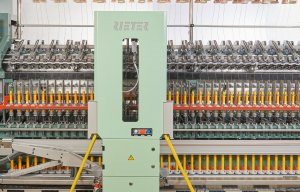
Inevitable 2020 sales dip for Rieter
Unique marker is applied directly to the fibre allowing a brand, a supplier, a production lot or a producer to be identified.

12th April 2022
Innovation in Textiles
|
Winterthur, Switzerland
Rieter, the leading supplier of systems for short-staple fibre spinning, has joined forces with Haelixa, the developer of a DNA traceability solution to offer a new concept for marking fibres during yarn production.
The solution addresses the increasing demand for reliable traceability data and provides forensic evidence of the origin of textile materials. This is becoming increasingly important given the growing demand for organic or recycled raw materials.
Haelixa’s solution supplies full textile supply chain transparency from source to retail. The company’s marker is applied directly to the fibre which allows a brand, a supplier, a production lot or a producer to be identified. The marker is harmless for humans and the environment, Oekotex 100 compliant and Global Organic Textile Standard (GOTS) certified, yet strong enough to withstand all industrial processing. The test to verify the origin or authenticity of the material can be completed with the garment or any intermediate product.
The solution seamlessly integrates into existing equipment and the two companies have already completed joint in-house testing and validation, resulting in the launch of an automated application of the marker in Rieter spinning systems in liquid form.
“At Rieter, we’re seeing an increasing demand from our customers to provide more transparency along the supply chain,” said Rico Randegger, head of Rieter’s after sales business group. “With this solution, Rieter is offering customers an automated traceability function as part of their systems which will help them add value to their products for greater success. Rieter and Haelixa will advance the application concept in line with spinners’ needs.”

Business intelligence for the fibre, textiles and apparel industries: technologies, innovations, markets, investments, trade policy, sourcing, strategy...
Find out more